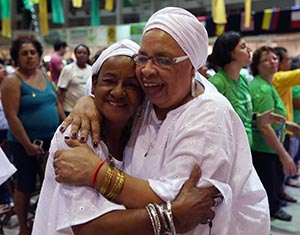VATICAN CITY — Saying he knows the history of the subjugation of women continues to have a negative impact on how women are treated, Pope Francis called for greater roles for women in the church and for greater assistance and workplace flexibility to ensure they can make the best choices for themselves and their families. In this July 20, 2013, file photo, two women from Brazil hug during a religious event at a local samba school in Rio de Janeiro. Pope Francis called for greater roles for women in the church and for greater assistance and workplace flexibility to ensure they can make the best choices for themselves and their families. (CNS photo/Marcelo Sayao, EPA)
In this July 20, 2013, file photo, two women from Brazil hug during a religious event at a local samba school in Rio de Janeiro. Pope Francis called for greater roles for women in the church and for greater assistance and workplace flexibility to ensure they can make the best choices for themselves and their families. (CNS photo/Marcelo Sayao, EPA)
Pope Francis told the Pontifical Council for Culture Feb. 7 that its study of women’s cultures was a topic “close to my heart,” and that he fully recognizes the need “to study new criteria and methods to ensure women feel they are not guests, but full participants in the various spheres of the life of society and the church.”
“This challenge can no longer be postponed,” he said.
The preparatory document for the meeting said that in the West, more and more women between the ages of 20 and 50 are leaving the church. Many have “reached places of prestige within society and the workplace, but have no corresponding decisional role nor responsibility” within the church community.
Pope Francis told the council – whose members are all cardinals, bishops, priests and laymen – “I am convinced of the urgency of offering space to women in the life of the church and to welcoming them, taking into account specific and changing cultural and social sensitivities.”
“A more widespread and incisive female presence in the community is hoped for so that we can see many women involved in pastoral responsibilities, in the accompaniment of persons, families and groups, as well as in theological reflection,” he said.
While they are equal, he said, women and men tend to have different qualities, and the church and society need both.
“You women know how to incarnate the tender face of God, his mercy, which translates into a willingness to give your time rather than to just occupy space, and to welcome rather than exclude,” the pope said. “In this sense, I like to describe the feminine dimension of the church as a welcoming womb that regenerates life.”
The council’s preparatory document used the technical term “generativity” to discuss the aspect of women’s lives involving physically or symbolically desiring new life, bringing it into the world, caring for it and finally letting it go. Richard Rouse, a council official, said in essence it means “helping life flourish.”
Donna Orsuto, a U.S. professor of spirituality at the Pontifical Gregorian University, was part of the group of mostly Italian women who compiled the working document for the plenary meeting and was one of the speakers at the plenary.
Generativity, she said, means “sharing life from one generation to next,” including through parenthood, but also by mentoring others, teaching, creating jobs and many other ways.
Both men and women are called to be generative, she said, explaining that stagnation is the opposite of generativity. “The truly generative person is creative, brings life and energy, and it’s about thinking about the next generation.”
“The big challenge is not to stereotype women” in any discussion about equality and differences, she said. “The key is not to use the idea that men and women are different as a tool to suppress women. But to use it in a positive way,” encouraging women and men to work together, bringing their diverse gifts to the church and the world.
Archbishop Paul-Andre Durocher of Gatineau, Quebec, president of the Canadian bishops’ conference and a member of the council, told Catholic News Service Feb. 6, the meeting created “spaces for dialogue” on a topic that brings together different ideas and lived experiences.
The archbishop, who was attending his first plenary meeting as a council member, said as soon as the topic was announced he sought additional input by reading and by talking to women, particularly women theologians, about their views on the proposed questions. It also gave him a further push to support programs that help Catholic women and men work together in the church, he said.
Asked if the council discussions made him think of any one particular woman, the archbishop responded, “my goddaughter, who is at university on an athletic scholarship. She is gifted in so many ways. The richness of her own life, the potential of her life and the world in which she is growing,” particularly all the choices that she faces, give the archbishop what he said was a “sense of wonderment.”
Pope Francis told the council that more must be done in society and in the workplace to ensure women really do have choices that enable them to use and develop their talents, exercise leadership roles and have a family if they choose.
“We must not leave women alone to carry this burden and to make decisions,” he said. “Rather, all institutions, including the church community, are called to ensure freedom of choice for women, so that they have the possibility to take on social and ecclesial responsibilities in a way that is in harmony with family life.”
